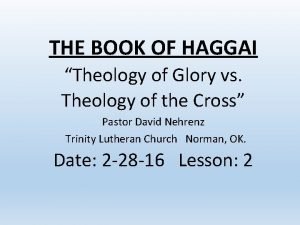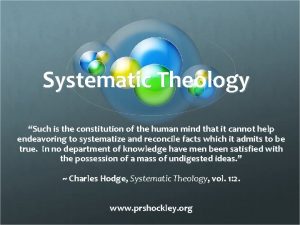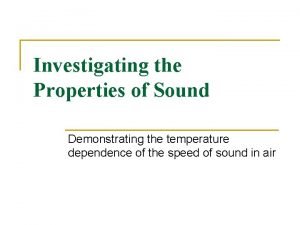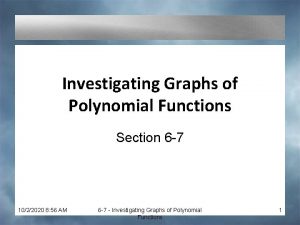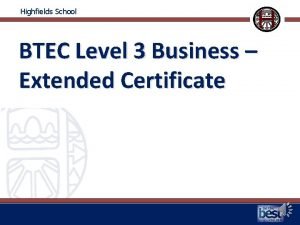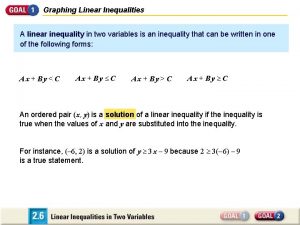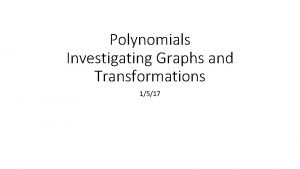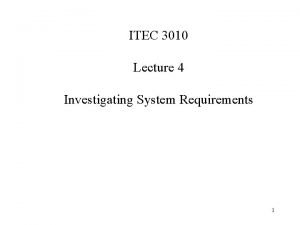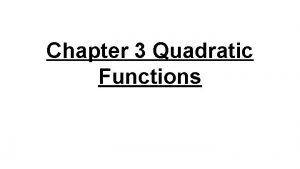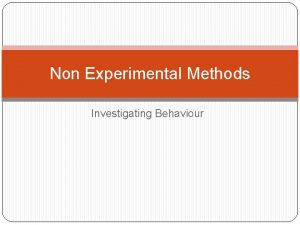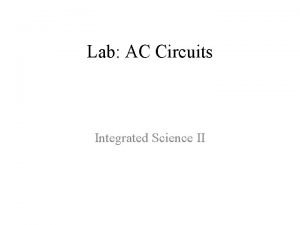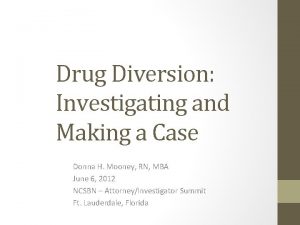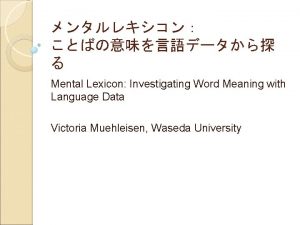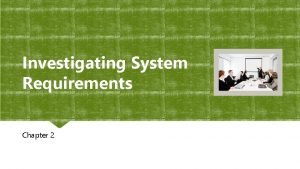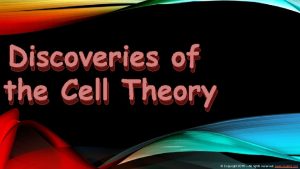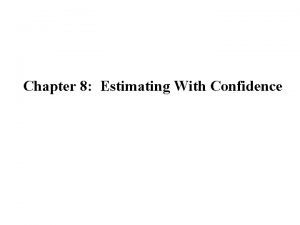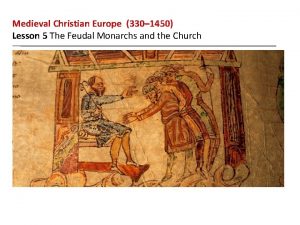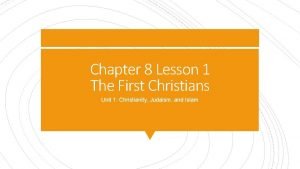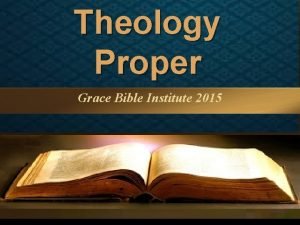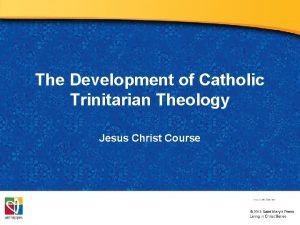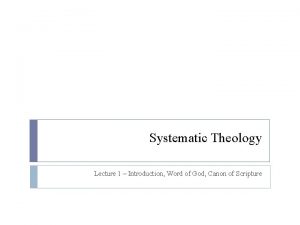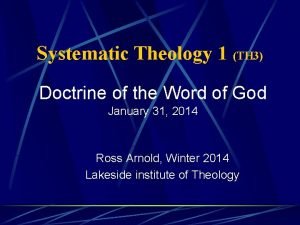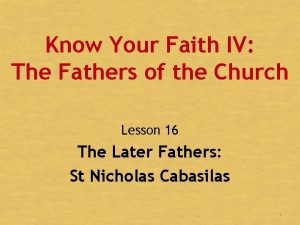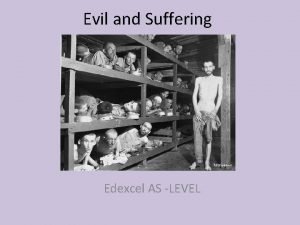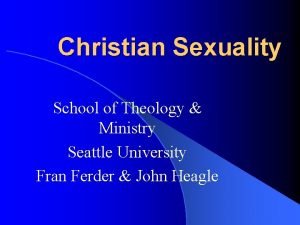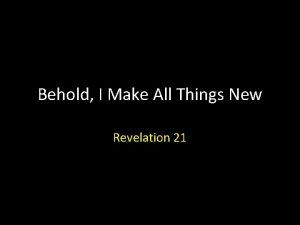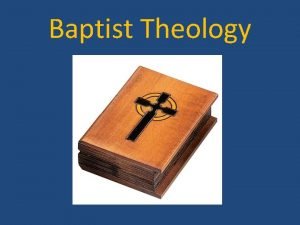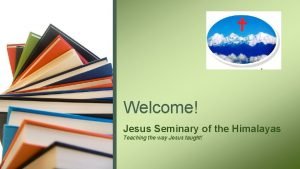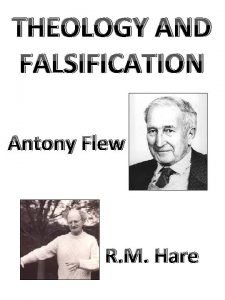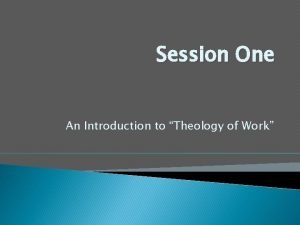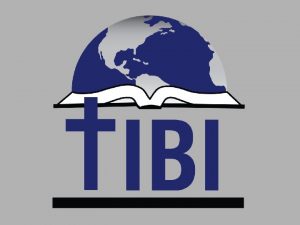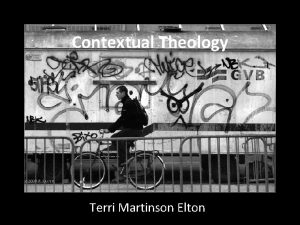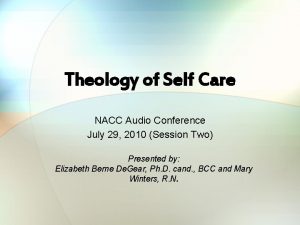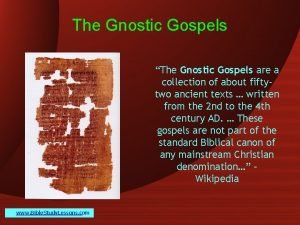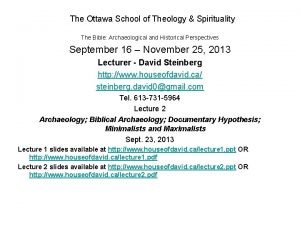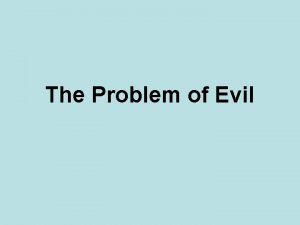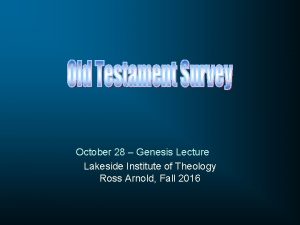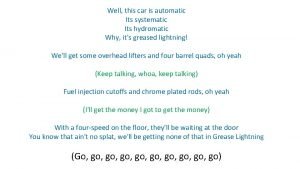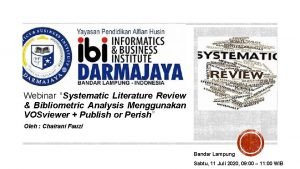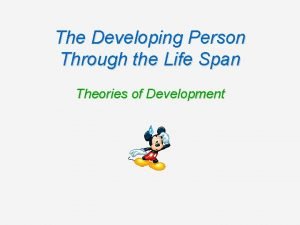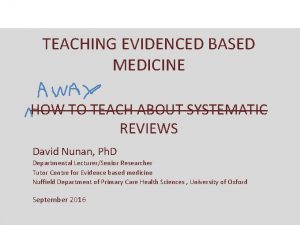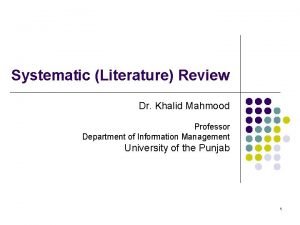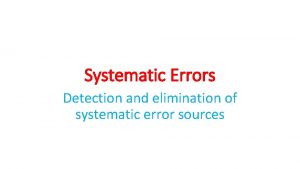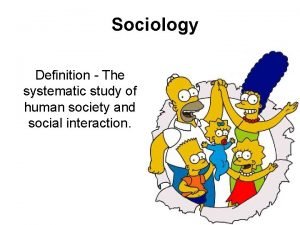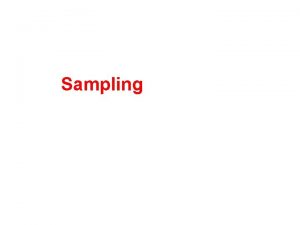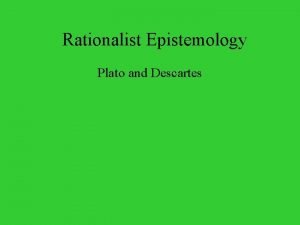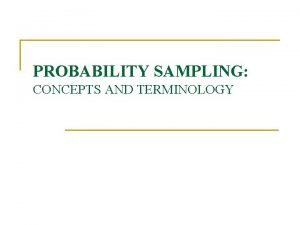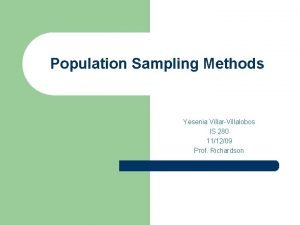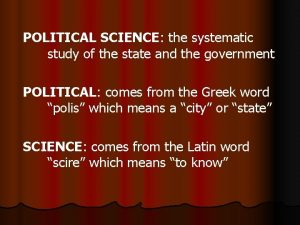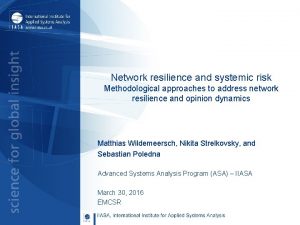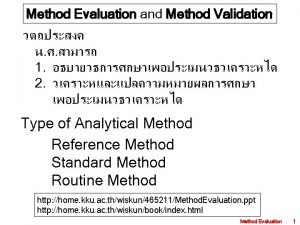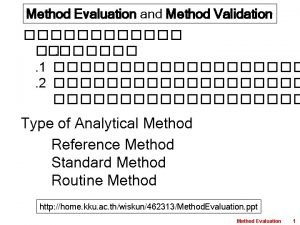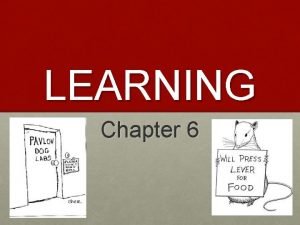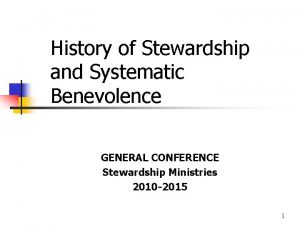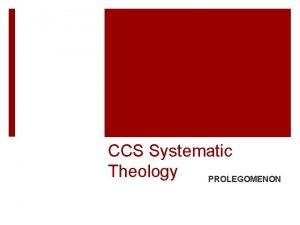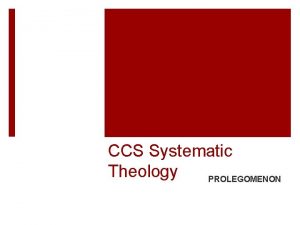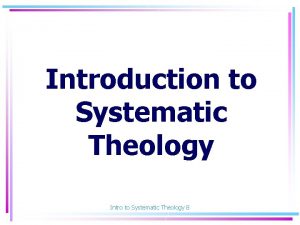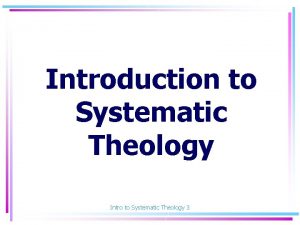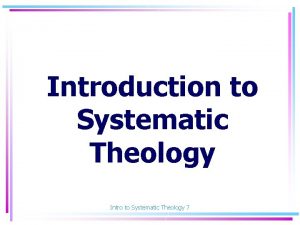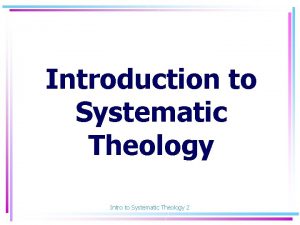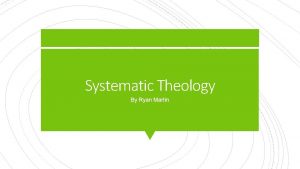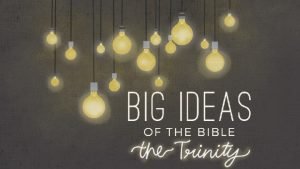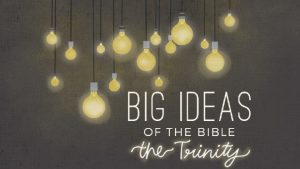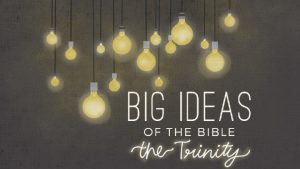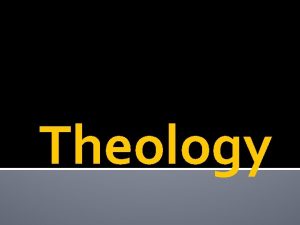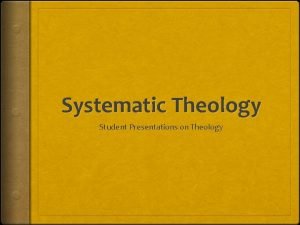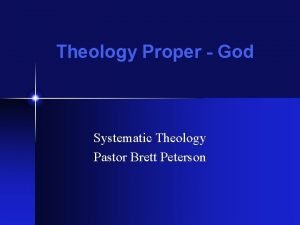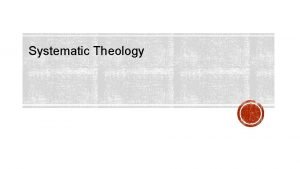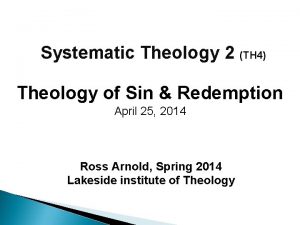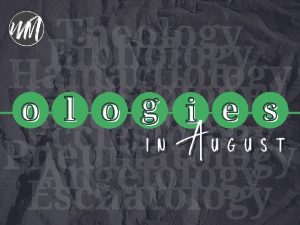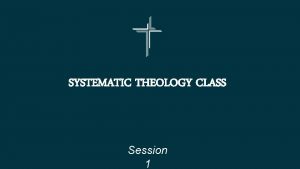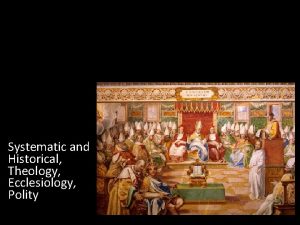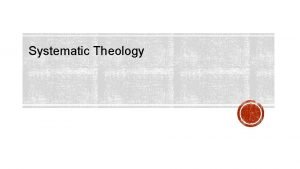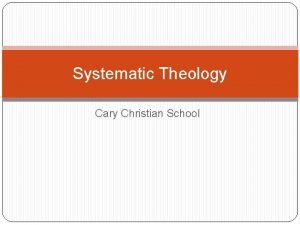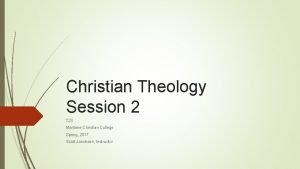Investigating Christian Theology 1 Systematic Theology 1 Lesson






















































































- Slides: 86

Investigating Christian Theology 1 Systematic Theology 1

Lesson 7 • Some Classic Approaches to Thinking about God’s Power and Wisdom

“One of Us” by Joan Osborne • If God had a name what would it be? And would you call it to his face? If you were faced with Him in all His glory What would you ask if you had just one question? • 1 -And yeah, God is great Yeah, yeah, God is good yeah, yeah-yeah

“One of Us” by Joan Osborne • What if God was one of us? Just a slob like one of us Just a stranger on the bus Tryin' to make his way home?

“One of Us” by Joan Osborne • If God had a face what would it look like? And would you want to see if, seeing meant That you would have to believe in things like heaven And in Jesus and the saints, and all the prophets? (repeat 1, 1)

“One of Us” by Joan Osborne • Back up to heaven all alone No, nobody calling on the phone No, just tryin' to make his way home Nobody calling on the phone 'Cept for the Pope maybe in Rome

Popularity of Spirituality • What other ways have God and other spiritual themes been presented in our popular culture, in television, songs, films, consumer goods, and advertising?

• “Not every declaration of ‘Lord, Lord’ is a true and vital witness to the Triune God of Christian proclamation. ”

Supper at Emmaus Rembrandt




Who is God, and How May We Approach Him? • Approach with Respect, Honor • “En Sof” – “without end” • Do not confuse our ideas and doctrines about God with the ultimate reality Himself • “a se” – “of or from itself” – Divine “aseity”

Who is God, and How May We Approach Him? • Via negativa – Emphasizes what God is not • Via eminentiae – By extrapolation from the good around us – “degrees of excellence”

The Classic Attributes of God: Power and Wisdom • How is the word “power” used in your everyday world? • Should we uphold the traditional view of God as “allpowerful” (onmipotent)? • Should we refer to God in “kinder, gentler” terms?

List Traits of God • • Loving Holy Merciful Trustworthy Infinite Immeasurable Gracious Slow to anger

God’s Power • “God can do all that He wills, even though He does not will all things that He can do. ” – John of Damascus • God’s power is always in service to His love (Barth, Bonhoeffer, Jürgen)

God’s Power • What sort of power is displayed in the incarnation of Jesus Christ? Is it “naked power” or “needy power”? • What about the Resurrection? • What type of power was exhibited when God the Father raised God the Son to life again, in the power of God the Spirit?

God’s Power • • • Resource 7 -3 Barth Moltmann Bonhoeffer Paul

The Wisdom of God • Share about the wisest person you have ever known. • Are there any believable examples of even finite wisdom currently available?

The Wisdom of God • What do we mean by wisdom? Are such words as understanding, knowledge, discernment, and awareness suitable synonyms? Is wisdom something that comes only with age, or might we expect it sooner?

The Wisdom of God • “wisdom is not a separate being carrying out the commands of God but God himself in action imprinting his plan upon the whole of creation. ” – Bloesch • Proverbs 8 • Jesus is “the power of God and the wisdom of God” (1 Cor. 1: 24)

Hymn Study

Proverbs 8

Lesson 8 • Some Classic Approaches to Thinking about God’s Holiness and Love

Holiness Forevermore By Haldor Lillenas • There’s a blessed and triumphant song; Holiness forevermore! It is sung by the mighty bloodwashed throng; Holiness forevermore! • Holiness forevermore! We will sing it, shout it, preach it, and live it; Holiness forevermore!

Holiness Forevermore By Haldor Lillenas • We will shout our glorious liberty; Holiness forevermore! We will sing it by the crystal sea; Holiness forevermore! • Holiness forevermore! We will sing it, shout it, preach it, and live it; Holiness forevermore! • © 1993 by Lillenas Publishing Co.

Holy, Holy by Reginald Heber • Holy, holy! Lord God Almighty! Early in the morning our song shall rise to Thee; Holy, holy, merciful and mighty! God in three Persons, blessed Trinity!

Holy, Holy by Reginald Heber • Holy, holy! All the saints adore Thee, Casting down their golden crowns around the glassy sea; Cherubim and seraphim falling down before Thee, Who was, and is, and evermore shall be.

Learner Objectives To help students: • appreciate more fully theological heritage of the Church of the Nazarene as a Holiness denomination • compare and contrast Nazarene views with select views from other theologians

Learner Objectives • consider the relation between God’s intrinsic holiness and humanity’s derived, dependent holiness • reflect once again on God’s great love for the creation and for humankind

The Holiness of God • Of particular interest to Nazarene theologians • A “primal attribute” • Wiley: “holiness belongs to the essential nature of God in a deeper and more profound sense than merely as one attribute among others. ”

The Holiness of God • Organizes the other elements into a coherent whole • Grider: “the summation of what He is…God’s holiness is a synonym of His deity, of himself. ” • Separateness from all that is defiled, profane and impure.

The Holiness of God • Dunning: 3 choices for relating God’s holiness to rest of His attributes – Holiness as one among the others – Holiness as “sum total” of His attributes – Holiness is the background for all the other attributes

The Holiness of God • Wolfhart Pannenberg: holiness as separation from everything profane – Judgment, and – “Hope of new and definitive salvation” • Langdon Gilkey: the absolute “otherness” of God – the “divine aspect of any attribute asserted of deity”

The Holiness of God • Marcus Borg: – “moving from a God of requirements to a God of relationships” – Sees God as “the One Who loves”

The Holiness of God • Evaluation of Borg: – Yet relationships include duty and obligation: requirements – The call to be holy is a divine command – Yet enabled by divine grace – Borg seems to ignore the need for repentance

The Holiness of God • Thomas C. Oden: – Holiness reflects God’s moral qualities (agrees with Nazarene emphasis) – “the moral quality that best points to God’s incomparably good character, as one incomparable in power, is holiness” – “It is more fitting to view God’s perfection precisely as God’s holiness”

The Love of God • Wesley considered love as “the heaven of heavens” • “God is love” 1 John 4: 8, 16 • No conflict between the divine love and the divine holiness

The Love of God • Dunning identifies love with prevenient grace indicating the centrality of love for the Wesleyan understanding of God • Dunning: “that this love is ‘holy love’ guards…against a perversion into actual rather than potential universalism”

The Love of God • Donald Bloesch: we cannot separate God’s love from His holiness – “…in Jesus Christ…we come to understand the unity of His mercy and holiness, the inseparability of his love and wrath. ”

The Love of God • What is the relationship between the divine anger and the divine love? • Consider Isaiah 54: 8, “In overflowing wrath for a moment I hid my face from you, but with everlasting love I will have compassion on you, says the Lord, your Redeemer. ”

The Love of God • Barth: “God is holy because His grace judges and His judgment is gracious. ” • Love, Holiness, Wrath: How are these three concepts related to one another within God, and what are the implications of this relationship for the Christian life?

The Love of God • What are “judgments of God? ” • Do you have other personal stories about the judgment of God?

The Love of God • Contrast between agape love and eros love – Resource 8 -4, pg 98

Lesson 9 • Recent Ways of Speaking of God and Thinking Theologically

Pluralism & Multiculturalism • Have come to our doorstep • 2 fairly recent theological movements: – Liberation theology – Ethnic theology

Objectives • To survey some theological trends of the past 35 or 40 years • Sharpen & develop our critical theological skills • Become more aware of current thought trends that impact theological thinking

Liberation Theology • One of the major developments of the last half of the 20 th century • Started in the late 1960 s in South America • Major theme: God favors the poor, marginalized and oppressed of the world. • It is among the poor where God especially can be found

Biblical Foundations of Liberation Theology • Liberationists claim their theology is biblical • Believe that liberation is a privileged message, used to interpret all other biblical messages

Biblical Foundations of Liberation Theology • The whole population of the world tends to be divided into two groups: The oppressed and the oppressors • God sides with the oppressed

Biblical Foundations of Liberation Theology • OT themes – The prophets focus on justice, equity & fairness – Shalom – Year of the Jubilee • Liberation starts with the poor and eventually reaches the oppressor, too

Biblical Foundations of Liberation Theology • Life of Jesus – Began life as a refugee – Politics led to His death – Rose to give hope to those engaged in political (& even military) struggles for justice • Calls for redistribution of wealth to the “have nots” • Believed early Christians all practiced communal living

Luke 4: 18 -19(NIV) • 18"The Spirit of the Lord is on me, because he has anointed me to preach good news to the poor. He has sent me to proclaim freedom for the prisoners and recovery of sight for the blind, to release the oppressed, 19 to proclaim the year of the Lord's favor. "

Who Are the Poor, Anyway? • Liberationists start with the poor to “do theology” – Preferential option for the poor (God prefers the poor and we should too) – Epistemological privilege of the poor (the poor are more insightful & see reality better than anyone else)

Who Are the Poor, Anyway? • Wesley suggested that the poor have fewer obstacles between them & the Lord • Mother Teresa of Calcutta claimed that the people of the U. S. were the poorest, because material wealth had blinded them to what really matters

Who Are the Poor, Anyway? • Matt. 8: 17 – “This was to fulfill what had been spoken through the prophet Isaiah, ‘He took our infirmities and bore our diseases’” • Must apply to more than spiritual diseases

Who Are the Poor, Anyway? • Liberation theology stresses that spiritual problems often are caused by poverty, hunger, homelessness, etc. • Agrees with Marx’s belief that material causes were responsible for all the world’s ills.

Who Are the Poor, Anyway? • Boff & Pixley: The poor “are those who suffer from basic economic need, those who are deprived of the material goods necessary to live with any dignity”

Who Are the Poor, Anyway? • “Collective” – poverty is a social, structural, massive problem • “Conflictive” – the poor are victims of an oppressive system • “Alternative” – the poor need a better future to inherit

Discussion • The place of the poor in history is very important to liberationist perspectives • What personal experiences have you had with the poor?

Discussion • Contrast Matt. 5: 3, “Blessed are the poor in spirit, for theirs is the kingdom of heaven, ” with Luke 6: 20, “Blessed are you who are poor, for yours is the kingdom of God. ” • Did Jesus mean the same thing with these two “Beatitudes? ” If not, why not?

Basic Beliefs of Liberation Theology • “Praxis” & “Orthopraxis” – “committed action” • Importance of connection with the poor (base communities) • Boff brothers refer to “the evangelically poor” – voluntary poverty for solidarity with the poor

Basic Beliefs of Liberation Theology • 1. True faith practices liberation • 2. God takes the side of the oppressed • 3. The reign or kingdom of God will be accomplished in history & eternity • 4. Jesus’ work is to liberate the world

Basic Beliefs of Liberation Theology • 5. The Holy Spirit is the “Father of the poor” and is present in all the struggles of the poor • 6. The Virgin Mary is the “prophetic and liberating woman of the people. ”

Basic Beliefs of Liberation Theology • 7. The church is the “advance guard” of liberation, the signpost pointing toward full liberation • 8. God is fully present in the poor, so whatever rights the poor have are at the same time the rights of God

Evaluation of Liberation Theology • There is much of value in liberation theology • But it is a new way of understanding & viewing the very task of theology – A new starting point: the poor – A new methodology • Social scientific analysis • New sources of religious knowing – Everyday experiences of the poor – Secular history

Evaluation of Liberation Theology • Close connection between theology & ethics • Views sin as systemic

Critique of Liberation Theology • While much of liberation theology’s outlook is true, it is incomplete • It is only selectively biblical • It needs more balance

Ethnic Theology: African-American • “If you haven’t shared the history, can you still sing the songs? ” • What difference would it make if we viewed the problem of suffering not exclusively in individualistic terms, but also in terms of group suffering? • African-American theology has much in common with liberation theology – God favors the poor – God works to improve the lot of the poor – Exodus – a key biblical passage

Ethnic Theology: African-American • James H. Cone – Bible re-read through the eyes of slaves – Political liberation became the key motif • Jesus viewed as a member of the downtrodden people

Ethnic Theology: African-American • Founder of African-American theology: Martin Luther King, Jr. – Fused American ideal of democratic freedom with OT impulse for justice, fairness and liberation – Added the NT ethic of love & hope found in Jesus – Nonviolent protest, influenced by Indian leader Gandhi

Ethnic Theology: African-American • True liberation will free both the oppressed and their oppressors

Ethnic Theology: Asian • Much contemporary theology rejects the God of classic theism. – Complaint: theistic God is not capable of suffering or change • Asian theology has stressed that God must suffer for us.

Ethnic Theology: Asian • Andrew Sung Park – concept of han – “unrelieved suffering” – “Han” sides with the victim – “Han” is the root of bitterness that never quite goes away completely – The cross of Jesus…as the piercing suffering of God as victim

Ethnic Theology: Asian • Most important currents of contemporary theology reject the “classic” belief in the omnipotence of God • The “God of han” might not be all-powerful, but is surely alltruthful

Ethnic Theology: Asian • For Asian theology, the truthfulness of God is more meaningful in dealing with evil & suffering (than omnipotence) because it speaks to our experience, exposing the power of injustice & evil

Ethnic Theology: Asian • Is there an opposition between God’s power and God’s truth? • Is not wisdom the same as truth? • If God is not all-powerful, can He really help us?

Summary • Can you give a one- to twosentence summary of liberation theology? • Of African-theology? • Of Asian theology?

Homework Assignment • Interviews & 3 page paper or • Research paper on Nazarene concern for poor, or Wesley’s work with the poor • Also, visit an ethnic congregation • Journal writing

I Know Why the Caged Bird Sings, by Maya Angelou • The free bird leaps on the back of the win and floats downstream till the current ends and dips his wings in the orange sun rays and dares to claim the sky.

I Know Why the Caged Bird Sings, by Maya Angelou • But a bird that stalks down his narrow cage can seldom see through his bars of rage his wings are clipped and his feet are tied so he opens his throat to sing.

I Know Why the Caged Bird Sings, by Maya Angelou • The caged bird sings with fearful trill of the things unknown but longed for still and is tune is heard on the distant hill for the caged bird sings of freedom

I Know Why the Caged Bird Sings, by Maya Angelou • The free bird thinks of another breeze and the trade winds soft through the sighing trees and the fat worms waiting on a dawn-bright lawn and he names the sky his own.

I Know Why the Caged Bird Sings, by Maya Angelou • But a caged bird stands on the grave of dreams his shadow shouts on a nightmare scream his wings are clipped and his feet are tied so he opens his throat to sing

I Know Why the Caged Bird Sings, by Maya Angelou • The caged bird sings with a fearful trill of things unknown but longed for still and his tune is heard on the distant hill for the caged bird sings of freedom.
 Theology of glory vs theology of the cross
Theology of glory vs theology of the cross Elenctic theology definition
Elenctic theology definition Investigating the world of work. lesson 1
Investigating the world of work. lesson 1 Investigating the properties of sound
Investigating the properties of sound Investigating science hsc
Investigating science hsc Investigating graphs of polynomial functions
Investigating graphs of polynomial functions Investigating graphs of functions for their properties
Investigating graphs of functions for their properties Unit 14 customer service
Unit 14 customer service Investigating graphs of polynomial functions
Investigating graphs of polynomial functions Unit 14 investigating customer service assignment 2
Unit 14 investigating customer service assignment 2 Investigating the graph of an inequality
Investigating the graph of an inequality Creative imedia r082
Creative imedia r082 Investigating polynomials
Investigating polynomials Investigating system requirements
Investigating system requirements Science 14 module 1 answer key
Science 14 module 1 answer key How delta is formed
How delta is formed Investigating graphs of polynomial functions
Investigating graphs of polynomial functions Investigating quadratics
Investigating quadratics Investigating rivers
Investigating rivers Investigating skills thomas edison
Investigating skills thomas edison Methods of investigating behaviour
Methods of investigating behaviour Integrated science labs
Integrated science labs What is this shape called
What is this shape called Investigating and making a case for drug diversion
Investigating and making a case for drug diversion Word meaning
Word meaning Investigating system requirements
Investigating system requirements Specific heat capacity question
Specific heat capacity question Cell theory contributors
Cell theory contributors Suppose your class is investigating the weights of snickers
Suppose your class is investigating the weights of snickers Which actions did french kings take to increase royal power
Which actions did french kings take to increase royal power Lesson 1 the first christian answer key
Lesson 1 the first christian answer key Define theology proper
Define theology proper Theology proper definition
Theology proper definition Theology and falsification
Theology and falsification The development of catholic trinitarian theology
The development of catholic trinitarian theology Theology proper lecture notes
Theology proper lecture notes What is theology
What is theology Palamite theology
Palamite theology Process theology
Process theology Seattle university school of theology and ministry
Seattle university school of theology and ministry Jon courson theology
Jon courson theology Eccumenicalism
Eccumenicalism Arminian theology
Arminian theology Mike mazzalongo church of christ
Mike mazzalongo church of christ 5 pillars of reformed theology
5 pillars of reformed theology Himalayan graduate school of theology
Himalayan graduate school of theology Antony flew falsification
Antony flew falsification The crucible imagery
The crucible imagery Theology of work
Theology of work Practical theology mpt
Practical theology mpt Praxis model of contextual theology
Praxis model of contextual theology The crucible vocabulary act 3
The crucible vocabulary act 3 Theology of self care
Theology of self care Gnostic gospels summary
Gnostic gospels summary Ottawa school of theology and spirituality
Ottawa school of theology and spirituality New creation theology
New creation theology Theology of missions
Theology of missions Inconsistent triad
Inconsistent triad Lakeside institute of theology
Lakeside institute of theology Monotheos
Monotheos Weak and strong syllable
Weak and strong syllable Its systematic it hydromatic
Its systematic it hydromatic Systematic decision making process
Systematic decision making process Vosviewer alternative
Vosviewer alternative Steps in systematic desensitization
Steps in systematic desensitization A systematic statement of principles and generalizations
A systematic statement of principles and generalizations Coverdale systematic approach
Coverdale systematic approach Qfas systematic review
Qfas systematic review Inclusion criteria examples
Inclusion criteria examples Systematic errror
Systematic errror Systematic instruction: hunter model
Systematic instruction: hunter model Systematic study definition
Systematic study definition What is a systematic approach to problem-solving
What is a systematic approach to problem-solving Consecutive sampling
Consecutive sampling Was plato a rationalist
Was plato a rationalist Proportional systematic error
Proportional systematic error Simple random sampling
Simple random sampling Quality assurance
Quality assurance Systematic sampling
Systematic sampling Politics
Politics Network resilience a systematic approach
Network resilience a systematic approach Systematic desensitization worksheet
Systematic desensitization worksheet Upcr calculation
Upcr calculation Proportional systematic error
Proportional systematic error Is a systematic relatively permanent change in behavior
Is a systematic relatively permanent change in behavior Facilities planning
Facilities planning General conference stewardship department
General conference stewardship department
